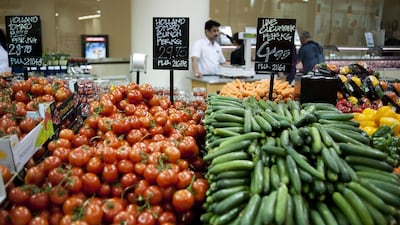ABU DHABI // The Netherlands and African nations are expected to play a significant part in ensuring food security for the UAE and wider region as global demand for food grows.
With its scarcity of water and arable land, the UAE is looking to ship in more agricultural products, of which the Netherlands is the world’s second-largest exporter.
It is also looking to further its investment in African farmland, seek out international innovations in farming, and provide its own farmers with programmes to help ensure more productivity.
The Netherlands has been named official Country of Honour for next week’s Global Forum for Innovations in Agriculture in the capital, expected to draw 125 exhibitors and 1,800 delegates.
Those attending will share solutions and innovations for the challenges in providing food security for a growing global population, with decreasing amounts of arable land.
“There are a lot of challenges,” said Mohammed Al Rayssi, communications director of the Abu Dhabi Food Control Authority (FCA).
“We’re trying to explore and make connections between the private sector and the Government to build up a network that can help the future of our children, to solve problems that might emerge.”
Mark Beaumont, the forum’s project director, said: “We’re not blessed here with a climate to grow food, and importing is fine if we can continue to afford it, but also if the countries produce the surpluses of products we need. If either stop, we have a problem.
“Worldwide floods and drought are making it very difficult and all these things put together make you realise the scale of the challenge.”
Gerard Michels, the Netherlands' ambassador to the UAE, said the most important part of the equation was sustainable agricultural innovation.
“To feed all these people something will have to be done and sustainable agricultural innovation will be essential,” said Mr Michels.
“Exporting our products is not enough. We also export our knowledge and hands-on expertise, and shape them into working partnerships across the world.”
He said the cornerstone was a close collaboration between the private and public sectors, and research institutes.
“We do not initiate any activity that is non-sustainable,” Mr Michels said. “In the Gulf, that means smart agriculture that uses water efficiently, reduces post-harvest losses, sustainable aquaculture, horticulture and poultry.
“To achieve that we need technology and investment but also education and training. Skills and expertise form the backbone of agricultural innovation.”
Such innovation is the aim of several programmes being conducted across the UAE, involving new irrigation methods, hydroponics and trials of salt and heat-resistant fodders.
The FCA will use the forum to announce that it will provide its 26,000 farmers with organic fertiliser at half price.
“We’re trying to facilitate the task and provide them with anything that can enhance production,” said Mr Al Reyassi. “Once approved, they will be able to pick up their fertiliser from selected companies.”
Mr Beaumont said the forum would allow the country to gather technologies needed in the region to grow more food.
“We have to accept that we live in a hyper-arid part of the world,” he said. “So some kinds of food cannot be produced, like wheat, maize and rice. For these, we have to look outside the GCC’s boundaries.”
Mr Beaumont said Africa stood above all regions in terms of potential agricultural production.
The UAE has already invested in farmland in Namibia, Egypt, Pakistan and Morocco.
“Africa has the ability to produce all the food it requires for itself and, if carried out correctly, most of the food the rest of the world needs too,” he said.
“The forum will give us in the GCC an ideal opportunity to form partnerships with people from Africa to secure the foodstuffs we desperately need.”
The forum runs from Monday to Wednesday next week.
cmalek@thenational.ae

